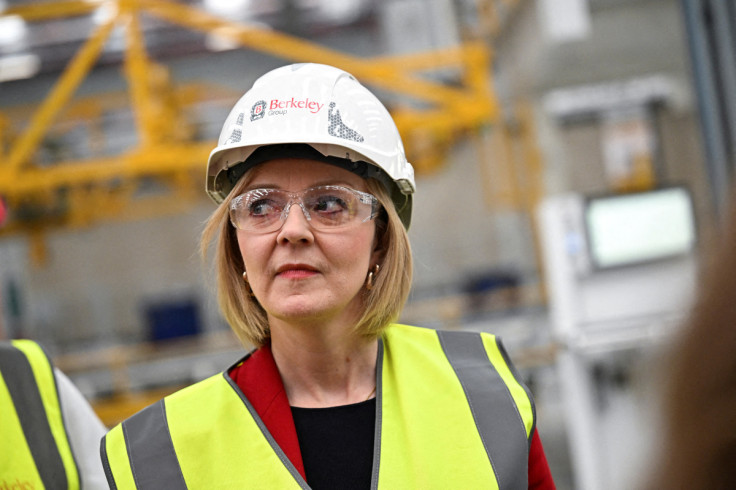Trust me, UK's Truss pursues charm offensive at her party conference
British Prime Minister Liz Truss heads to her Conservative Party conference next week with a packed diary of "meet and greets" to try to win over lawmakers angry over an economic plan that triggered market chaos and badly eroded support.

British Prime Minister Liz Truss heads to her Conservative Party conference next week with a packed diary of "meet and greets" to try to win over lawmakers angry over an economic plan that triggered market chaos and badly eroded support.
Less than a month into her tenure as prime minister, Truss is fighting to win backing for a radical economic plan aimed at spurring growth but which instead sent the pound to record lows and the cost of government borrowing spiralling.
For some voters the market chaos initially felt removed from everyday life but as soon as mortgage lenders started pulling their products and signs emerged that the country's pensions could be at risk, attitudes began to turn.
Support for the governing party has plummeted. Polls show opposition Labour taking commanding leads, with one saying the party was a record 33 points ahead - which, if replicated at an election, would see dozens of Conservatives voted out.
Truss has shown no sign of changing tack even in the face of criticism from the International Monetary Fund and from governments which fear the impact of her plan on a global financial system weighed down by debt.
Instead, at the conference starting on Sunday, she plans to woo her lawmakers, particularly those who backed her leadership rival, former finance minister Rishi Sunak. She must convince them to give her time to secure the kind of economic growth that has eluded Britain for at least a decade.
If she fails to win the party over, her tenure before an election expected in 2024 could be cut short.
Some Sunak supporters said they were ready to give her the benefit of the doubt.
"My side lost, Liz deserves our support to give her exciting new agenda the best possible chance," one Conservative lawmaker said with some on condition of anonymity.
Another, who also backed Sunak, said the strategy was "misjudged" but it would be "ridiculous" for the party to try to remove her. "We shouldn't panic yet ... We need to give them time to turn this around."
Some Conservative lawmakers want Truss to immediately reverse the scrapping of highest rate of income tax, or modify a message they feel suggests the government does not care about either the markets or the voters struggling to make ends meet.
Truss, though, has said she will not U-turn and is looking at the next steps in her plan.
MEDICINE
As markets tumbled on Monday, Truss was in her Downing Street office working on those next steps, a source close to her said, referring to further expected measures that some describe as harking back to former British former prime minister Margaret Thatcher's pursuit of deregulation and a small state.
Her supporters say they knew her tax-cutting package would be met with opposition from the "establishment" but that the market reaction was overblown, a result in part of a jump in U.S. interest rates and what they call "global headwinds".
But even some of them suggest Truss and her team should have spent more time preparing investors for a plan which ignored the convention that governments explain how they will fund their promises.
Truss's team says that will come later - mapping out spending costs when its clear how much revenue comes in.
One Conservative party insider said the team failed to explain the depth of Britain's problems and then "sounded ideological in a vacuum".
It is criticism Truss' team understands but, with an election due in 2024, she had to act fast, sources close to her said. Truss and finance minister Kwasi Kwarteng now have moved to try to ease concerns in financial institutions, but are sticking to the plan.
Patrick Minford, an economist who defended Thatcher's policies and who Truss cited as the expert who backed her tax-cutting plans, told reporters on Thursday she should press on. "Truss needs to keep doling out of the medicine."
Minford said he expected growth of more than 2% next year and inflation to fall to 5% if Truss pursues her policies. The Bank of England said in August it expected Britain's economy to shrink by 1.5% in 2023 and inflation of 5.5%.
Some economists think it unlikely her policies will achieve even that modest measure of success, but if she does, it may still mean difficulties in the short term for voters. Already struggling with inflation and higher energy costs, some now face the prospect of increased mortgage payments and possible cuts to benefits.
"It'll be if/when interest rates rise and mortgages go up that people will become more vocal," said Antony Mullen, a local Conservative councillor in the northeastern English city of Sunderland.
Speaking to regional radio stations and being asked about people struggling and markets in chaos on Thursday, Truss struggled to offer reassurance.
Jane Foley, head of foreign exchange strategy at Rabobank, said the prime minister could struggle to win back trust she had already lost.
"Any politician that thinks the markets are wrong very quickly learns that this is not the case," Foley said.
Copyright Thomson Reuters. All rights reserved.








